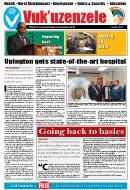Oct 2014
Oct 2014 sadminUpington gets state-of-the-art hospital
Upington gets state-of-the-art hospital sadminAbout 43 new state-of-the-art hospitals are expected to be built across South Africa within five years.
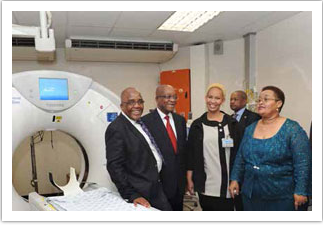 In addition, 216 new clinics will be built and 816 old hospitals will be renovated across the country, said Health Minister Dr Aaron Motsoaledi.
In addition, 216 new clinics will be built and 816 old hospitals will be renovated across the country, said Health Minister Dr Aaron Motsoaledi.
He was speaking at the official opening of the R1 billion Dr Harry Surtie Hospital in Upington, in the Northern Cape, recently. The new 327-bed hospital was officially opened by President Jacob Zuma as part of government's infrastructure roll-out programme.
Minister Motsoaledi said these developments would help bring the National Health Insurance (NHI) into operation, and ensure that everyone has access to appropriate, efficient and quality health services.
He said government specifically built stateof- the-art hospitals in small towns and rural areas to provide quality services to the public.
These hospitals are expected to attract skilled doctors and medical students and have world-class equipment and technology.
“When you ask doctors why they don’t go to the rural areas, they will tell you that there is no equipment. Some will tell you that they want to advance their careers and it won’t be possible in rural areas,” the Minister added.
Much-needed services
Community member, Mponeng Mabe, 62, of Pabalelo location, said she was delighted that the hospital was built close to her community. Before the new hospital opened, Mabe used to take two taxis to get health services from the old Gordonia Hospital.
“Whenever I got transferred there (Gordonia) by the clinic, I got so frustrated by the thought of sitting for almost an hour in a taxi not feeling well, plus I would have to queue again once I got to the hospital.
This is great for us. I am really happy,” said Mabe, who lives almost eight kilometres from the hospital. Another resident, Sonia Lephepha, said it had been her wish to have a hospital closer to her home because she is aging.
“My husband and I are aging, and travelling to the hospital is already a problem. So I am happy because I just take one taxi from my house to this new hospital,” said 63-year-old Lephepha.
Lephepha, who has been living at Pabalelo for more than 30 years, said she was aware that the new hospital, located in Progress, would also create jobs for youth in Upington and neighbouring areas.
“Maybe my children or grandchildren will work at the hospital,” she said.
Moving our country forward
President Zuma said building decent health facilities would move South Africa a step forward.
“Together we will move our country forward to security and comfort for all,” said the President.
President Zuma also said apart from making health services available to the community, the construction of Dr Harry Surtie Hospital also created more than 200 direct and indirect jobs to residents of Upington and surrounding areas.
The expansion of regional services in the new Dr Harry Surtie Hospital will reduce referrals to Kimberley and improve local access to more specialist services.
The new hospital serves the western half of the Northern Cape Province, as Upington alone has a population of about 70 000 people.
Training of clinical staff
President Zuma said the transfer of hospital services from the old Gordonia Hospital to the new Dr Harry Surtie Hospital opened up opportunities for training by expanding nursing college facilities.
“In addition to the Henrietta Stockdale Nursing College in Kimberley, I am pleased to announce that there will be satellite colleges in Upington, De Aar and Kuruman,” said President Zuma.
He also announced that the new Upington Nursing College would be located at the old Gordonia Hospital site. Part of the college will provide training for Emergency Care services.
“There will be improved access to training for our nurses ensuring that training takes place within the province.”
Going back to basics
Going back to basics sadminMinister of Cooperative Governance and Traditional Affairs Pravin Gordhan says municipalities across the country should work differently, serve with care and respond to community concerns timeously.
“Complaints are that we don’t take people seriously and often take more time to respond. Sometimes we take three days to respond to something that could take one day. We need to change that and respond to problems timeously,” said Minister Gordhan at a recent Presidential Local Government Summit.
The Department of Cooperative Governance and Traditional Affairs (Cogta) launched a “Back to Basics” strategy after an assessment of the state of local government covering political stability, governance, service delivery, financial management, institutional management and community satisfaction.
“Going back to basics will ensure that in every municipality, traffic lights work, potholes are filled, water is delivered, refuse is collected, electricity is supplied, and refuse and waste management takes place,” the Minister added.
In response to the challenges facing municipalities, Cogta started a process of setting benchmarks for municipalities.
“This led to the development of the ‘Back to Basics’ strategy. This approach is about responding vigorously to immediate needs, understanding and responding to structural challenges, building resilient local government institutions and collectively shaping intergovernmental planning and delivery.”
He said two-thirds of municipalities were doing fairly well in delivering good services to communities.
“Our motto should be: No service failures,” Minister Gordhan added.
He also urged municipalities to maintain infrastructure properly.
* Read more on the Presidential Local Government Summit.
Minister Zulu takes charge of SMME development
Minister Zulu takes charge of SMME development sadminThe Minister of Small Business Development, Lindiwe Zulu, has been hard at work since her appointment earlier this year, giving entrepreneurs the necessary support to grow their businesses.
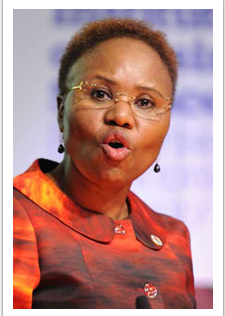 Delivering her Budget Vote, Minister Zulu said she would increase non-financial support, create a demand for cooperative produced services and products, and increase supply of financial support to cooperatives.
Delivering her Budget Vote, Minister Zulu said she would increase non-financial support, create a demand for cooperative produced services and products, and increase supply of financial support to cooperatives.
She added that small, medium and micro enterprises (SMME) could make a meaningful contribution to the National Development Plan’s target of creating 11 million job opportunities.
“We believe SMMEs and cooperatives are a critical means to empower our people, a mechanism to draw new entrants into the economy, strengthen inclusive growth, build the social economy, encourage solidarity and create large numbers of jobs,” said the Minister.
She added that SMMEs contributed 57 per cent of South Africa’s gross domestic product (GDP) and accounted for 56 per cent of employment.
Diepsloot SMME Incubation Hub
Minister Zulu and the Minister of Economic Development Ebrahim Patel also launched the Diepsloot SMME Incubation Hub recently.
The hub, which aims to create 50 000 permanent jobs, will be the first fully integrated mixed-use development that caters for all sizes of businesses, providing vital support and job creation to marginalised residential areas.
The SMMEs that will be incubated at the hub will be selected by their ability to make their businesses sustainable.
Building a Nation of Entrepreneurs
During the official opening of the Gordon Institute of Business Science Enterprise Development Academy (GIBS EDA) Minister Zulu said the academy must help build a nation of entrepreneurs.
The Enterprise Development Academy is a centre that focuses on providing scholarship-based education and support to micro and small business owners, helping them to grow sustainably and create jobs.
Minister Zulu said the long-term solution to the country’s unemployment crisis was to create a nation of entrepreneurs, not job seekers.
“Empowering young people is not an option, but a national imperative. Given the current state of youth unemployment in our country, we must challenge young people of today to seize the opportunities created by our democracy to create a better life for themselves and their fellow compatriots,” she said.
Minister Zulu added that entrepreneurship education needed to be taught from primary school level right through to higher education institutions.
The new academy will work on a scholarship-based programme offering education to all participants through the contributions of public and private sector partners.
SANRAL sponsors maths, science students
SANRAL sponsors maths, science students sadminThe South African National Roads Agency (SANRAL) has donated R30 million to higher education studies in mathematics, science and technology.
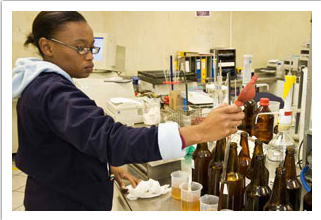 SANRAL and the University of the Free State (UFS) have jointly launched a new chair in science, mathematics and technology education.
SANRAL and the University of the Free State (UFS) have jointly launched a new chair in science, mathematics and technology education.
The R30-million donation is expected to last for five years, and is set to improve the quality of teaching in these subjects at township and rural schools.
The donation forms part of the university’s School Change Project (SCP), a flagship initiative launched by the vice-chancellor Prof Jonathan Jansen.
SANRAL CEO Nazir Alli said the agency was committed to helping more students enrol in science-related studies and careers, and had sponsored several programmes at tertiary institutions.
“Education is one of the key priorities of the South African government and SANRAL has for many years been offering scholarships and bursaries to high school learners and university students as a way of ploughing back into the community,” said Alli.
He said the success of government’s National Infrastructure Plan, which promises to create thousands of jobs and boost empowerment, would hinge on skills dependent on mathematics and science.
“By partnering with the University of the Free State and establishing the chair in science, mathematics and technology education, SANRAL will help to ensure that South African students can measure up to international standards in the mathematical world,” Alli said.
SANRAL said it would also train 44 teachers in mathematics and science at 22 schools.
Student teacher interns will help teachers and SCP mentors will monitor progress through weekly visits.
“The interns will receive financial support to pursue undergraduate studies in maths and science education, and in return, they will commit to teaching these subjects for a period of four years after the completion of their studies,” SANRAL said.
Back to Basics: government and citizens in partnership
Back to Basics: government and citizens in partnership Estelle Greeff
It is hard to believe that it is nearly six months since, as a nation and as individuals, we were all preparing to cast our votes in the fifth general election of our democratic era.
I recall how special and meaningful it was for me as a citizen and President of the Republic to make my own cross on the ballot paper at the Ntolwane Primary School in KwaNxamalala, Nkandla.
But I also recall the deep sense of responsibility I felt to all the people of our beautiful nation when Parliament elected me as President of Republic, tasked with the responsibility to implement radical socio-economic development in our country.
This responsibility is massive, but I am comforted and supported by the knowledge that the overwhelming majority of South Africans used their own ballot papers on the 7th of May 2014 to endorse our vision for a future South Africa.
In the five months since the new administration came into office, government has worked hard to act on the pledges we made to improve conditions in the country.
We have used the change-over in leadership nationally and provincially to make sure that we act on the promises we made during the election campaign to add more chapters to the Good Story South Africa has been able to tell since 1994.
In these five months, we have opened new schools and hospitals; we have been building new roads; we have opened factory plants for foreign investors who have come to our country; we have launched a development bank with our partners in Brazil, Russia, India and China.
We have also led the effort to secure peace and stability in our neighbour, Lesotho, and pleaded for a cessation of violence and a lasting political solution in the Middle East.
Closer to home, we have in the three months since July connected 48 751 households to the national power grid, and another 3 786 using non-grid technologies.
In recent weeks, we also launched the 100-day countdown to the day in December when Unit 6 of the Medupi Power Station near Laphalale in Limpopo will be fired up. This is a major milestone in our quest for a secure, predictable supply of electrical power which we need in our homes and workplaces.
"With the creation of a ministry for small business development, we have increased our efforts to make South Africa a nation of entrepreneurs; a nation of self-driven, self-sufficient people who are able to add to the wealth and wellbeing of our country..."
The Medupi coal power station, the first power station to be built by Eskom in 20 years, is being built near Lephalale in Limpopo.
Unit 6 of the new power station, which has faced numerous delays in its construction, is expected to be synchronised at midday on December 24.
Synchronisation, or first power, involves the generator being electrically connected to the power grid, so that its power is aligned with all the other generators and to generate and deliver electricity into the grid.
With the creation of a ministry for small business development, we have increased our efforts to make South Africa a nation of entrepreneurs; a nation of self-driven, self-sufficient people who are able to add to the wealth and wellbeing of our country.
During this time, we have also struck at the heart of highly organised, violent criminal syndicates in our major urban centres and have worked with international policing and investigative authorities to put a lid on transnational crime.
As I write, men and women in our health services and armed forces are doing our country proud amidst the tragedy of the collapse of the Synagogue Church of All Nations in Lagos, Nigeria, as they prepare to repatriate to South Africa the remains of those who died thousands of kilometres from home.
This is the South Africa in which we live. A South Africa where life is changing for the better each day and where have the means and will to respond to crisis.
To keep South Africa moving forward, I recently convened the Presidential Local Government Summit where we challenged local government to improve its performance and serve the people of South Africa in ways demanded by our Constitution.
Under the theme: “Back to Basics: Serving our Communities Better!” 1 650 delegates from the higher levels of the Public Service and from the ranks of organised labour, business, civil society and academic and research bodies focused on how to create conditions for decent living and happiness for all.
The Summit gave all of us as South Africans a platform to talk straight and plan clearly to improve basic services for all communities.
The Summit was held at a time when government is taking strong action to ensure that officials are in positions or jobs for which they are qualified and for which they have the necessary passion.
We are also taking action against officials who are not doing their work properly and who, when they are disciplined, try all sorts of methods to stay in place or to get as much suspension pay out of the system as possible.
Strong action is not limited to our disciplinary process; where we have a good enough case against officials who have neglected their duty or broken the law in the course of their work, we are handing them over to the criminal justice system for prosecution and the penalties that go with conviction.
In addition, we are taking action against private sector service providers who commit corruption or fraud, or who fail to deliver the services stipulated in service level agreements and contracts.
We will not tolerate this abuse of public funds or of government’s procurement from the private sector.
When it comes to service delivery in general, government’s responsibilities are clear - and so are the rights of citizens.
But as we think about a better South Africa, we also need to “get back to basics” as citizens in terms of our own responsibilities to the communities in which we live, and to the nation to which we belong.
For us as citizens, these basics involve doing what is right and showing respect for lives and property within our families, neighbourhoods and communities.
These basics involve discussing grievances and frustrations, rather than resort to unlawful or violent actions as a start, and forcing others to the negotiation table.
As citizens, we have every right to keep public officials to account but we should also hold ourselves to account for breaking the law or breaking the unwritten rules and behaviours of our society.
We may raise our fists in anger from time to time, but it’s much better to extend a helping hand. We are right to raise our voices, but we should at all times allow others to be heard as well. We can disagree with one another, without allowing differences of opinion to divide us as a people.
Government shares the responsibility and solutions for moving South Africa forward with all sectors of society and we will never turn away anyone with a valuable and workable idea or action.
Let’s work together to maintain the momentum of change in our country and let’s celebrate our successes even as we look our problems in the eye.
Our dignity and pride as a nation is our greatest asset, and we should treasure this with every thought, word and deed.
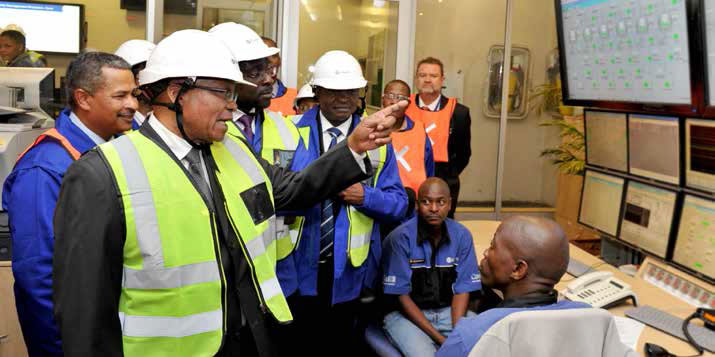 Together let us move South Africa Forward!
Together let us move South Africa Forward!
Jacob G Zuma
President of the Republic of South Africa
Improving the performance of local government
Improving the performance of local government sadminLocal Government Summit
President Jacob Zuma says great strides have been made in delivering basic services to South African communities in the 14 years since the inception of local government.
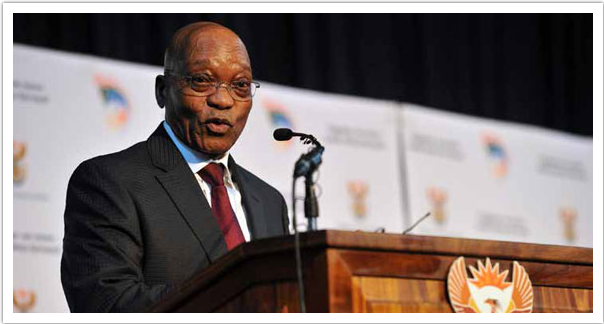 Leading the second Presidential Local Government Summit (PLGS) in Gauteng recently, he said the current administration would continue to work hard to achieve radical and meaningful change in the performance of local government.
Leading the second Presidential Local Government Summit (PLGS) in Gauteng recently, he said the current administration would continue to work hard to achieve radical and meaningful change in the performance of local government.
“Out of this summit must emerge a focused action plan, to strengthen local government by getting the basics right,” said the President.
He added that local government, together with other spheres of government, must provide basic services efficiently and effectively, and in a caring manner.
South Africa’s Constitution enshrines socioeconomic rights, including the rights to dignity, water, sanitation and housing, amongst other basic needs, the President said.
Progress in basic service delivery
He noted the progress in basic service delivery in various municipalities, and that the recent report on the non-financial census of municipalities confirmed that the services rendered by municipalities have reduced poverty.
“The report focuses on basic services, namely: water services, electricity services, sewerage and sanitation services, and solid waste management services offered by the 278 municipalities across the country.”
He said the report showed that 11,8 million basic water services were provided to households, with 5,3 million receiving free basic services. Of the 11.8 million who received basic water services, 2,5 million benefited from indigent support.
Indigent households are those that qualify for rebates or services subsidies.
President Zuma said the report also showed that 10 million consumer units were receiving sewerage and sanitation from municipalities in South Africa, and 31,1% of the consumer units had access to free basic sewerage and sanitation.
“These are just a few examples of positive developments mentioned in the report,” the President said.
He commended municipal leaders who have made a difference in changing peoples’ lives and living conditions, as demonstrated in the report.
The first PLGS was held at Khayelitsha in Cape Town in 2009, where the President encouraged the three spheres of government to work together.
President Zuma said the 2014 summit showed that all municipalities agree that the basic services and people’s needs must be met.
Going back to basics
Cooperative Governance and Traditional Affairs Minister Pravin Gordhan said the summit aimed to highlight successful achievements by municipalities and come up with solutions for issues that needed intervention. Minister Gordhan said too many municipalities fail to do the basics for their communities, and that the summit was all about going back to basics, serving communities better.
The Minister urged municipalities to only hire engineers and other technicians who would construct the best infrastructure developments that would last more than 20 years and deal with corruption.
“It is our collective responsibility to root out corruption in our municipalities and communities,” said Minister Gordhan.
The summit was attended by, among other delegates, all Mayors, Speakers, Chief Whips, Municipal Managers and Chief Financial Officers from the 278 municipalities of South Africa.
Success story
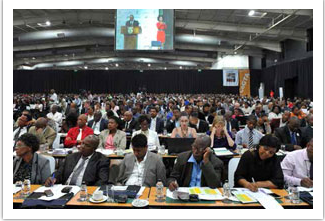 Steve Tshwete Local Municipality Mayor Mike Masina shared a success story of how the local municipality managed to be among the ones that performed well.
Steve Tshwete Local Municipality Mayor Mike Masina shared a success story of how the local municipality managed to be among the ones that performed well.
Masina said the municipality had developed a clear communication strategy to keep residents informed about its plans and challenges.
“We have a good working relationship with local print and electronic media. I have a column in one of the local newspapers, where I inform the community about our plans, on a weekly basis,” said Mayor Masina.
He added that the municipality also had a radio slot where executives spoke about programmes and challenges of the municipality, and received feedback from residents.
He said the municipality also had an SMS line it used to inform residents about any urgent announcements, including power and water outages.
The municipality also held regular mayoral meetings where each department under it reported on successes and challenges experienced.
The municipality also convenes mayoral outreach meetings to hear the concerns of residents, and attempted to address them in a week, where possible.
Functional municipalities needed to boost business growth
Functional municipalities needed to boost business growth Estelle GreeffLocal Government Summit
President Jacob Zuma says a well-functioning local government sector creates an enabling environment for the business sector to flourish and be sustainable, and for jobs to be created.
The President said this to representatives from the private sector who attended the Presidential Local Government Summit.
“We also warmly welcome the innovative Business Adopt-a-Municipality programme,” President Zuma said.
He said the Business Adopt-a-Municipality initiative was helpful in that it promoted a closer working relationship between government, state owned entities and the private sector. Vulnerable municipalities were also benefiting from the support arising from this initiative.
“We encourage more businesses to identify municipalities to support. This will help business to contribute to enhancing service delivery challenges in the local government sphere, and improve performance in general for the benefit of the cities and towns,” President Zuma said.
Among the business representatives at the summit was the Chairperson and Managing Director of Nestlé South Africa, Sullivan O'Carroll.
O'Carroll said businesses also needed support from municipalities, meaning the relationship had to be mutually beneficial.
“Our company employs more than 3 500 people in the country, and 95 per cent of our products are produced locally. Globally, we have about 500 factories… and we rely on electricity 24/7 to run our business smoothly,” O'Carroll said.
He added that power outages cost the company a lot of money as it resulted in a setback on production.
O'Carroll said Nestlé SA supports 2 000 plus farmers in South Africa alone, as they depended on farm products to produce their own products.
“Nestlé South Africa spends about R4 billion every year on procurement,” O'Carroll said.
He said the company managed to open two factories in the country, in partnership with local government and other stakeholders.
“We need to strengthen our relationship with municipalities,” O'Carroll
Thusong Service Centres put people first
Thusong Service Centres put people first sadminThusong Service Centres have made it easier for communities in urban and remote areas to access government services.
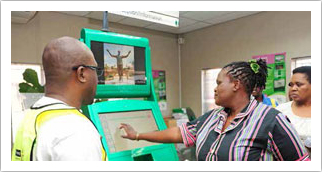 Speaking at the launch of Mamelodi Thusong Service Centre at Denlyn Mall east of Pretoria, Minister of Communications Faith Muthambi said government would continue to put the needs of the people first.
Speaking at the launch of Mamelodi Thusong Service Centre at Denlyn Mall east of Pretoria, Minister of Communications Faith Muthambi said government would continue to put the needs of the people first.
She also used the platform to call on public servants to improve services given to the public.
“It’s our belief that given all the service delivery protests that we have seen in recent times, there is a great need for all of us to do some introspection about how we are at the service of our people as a civil service,” said the Minister.
Minister Muthambi did a walkabout at the mall, where she introduced the services offered at a Thusong Centre to the people. During this session, the Minister listened to people from all walks of life, including unemployed youth, who had benefited from government’s training programmes.
She encouraged more South Africans to make use of the services offered at the Thusong centres.
“These centres are there to build the much needed bridges between the government and its people. Practically, these centres do not just disseminate information for the sake of it, but underline what we mean by development communications – communications that empower our people,” said Minister Muthambi.
Serving with care
She also reminded public servants of their responsibility towards communities.
According to the Minister, citizens accessing services were entitled to:
- Consultation: Citizens should be consulted about the level and quality of the public services they receive and, wherever possible, should be given a choice about the services that are offered.
- Service standards: Citizens should be told what level and quality of public service they would receive so that they are aware of what to expect.
- Access: All citizens should have equal access to the services to which they are entitled. • Courtesy: Citizens should be treated with courtesy and consideration.
- Information: Citizens should be given full accurate information about the public services they are entitled to receive.
- Openness and transparency: Citizens should be told how national and provincial departments are run, how much they cost and who is in charge.
- Redress: If the promised standard of service is not delivered, citizens should be offered an apology, a full explanation and a speedy and effective remedy. When complaints are made, citizens should receive a sympathetic, positive response.
- Value for money: Public services should be provided economically and efficiently in order to give citizens the best possible value for money.
“If all (public servants) abide by these principles, our service to the public will improve exponentially. I look forward to a changed culture of serving our people,” said Minister Muthambi.
Helping the nation
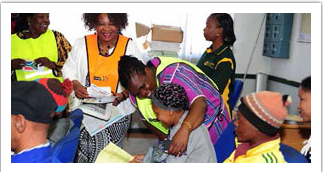
Currently, there are 183 Thusong Service Centres in 107 local municipalities countrywide. These are complemented by 114 integrated mobile routes taking government services to remote areas.
Services such as applications for identity documents, birth certificates, social grants and the Unemployment Insurance Fund, as well as municipal services can be found at the centres.
The services are provided by the relevant departments which have offices at the centres. The Thusong Service Centre Programme is one of the first unique initiatives introduced by the democratic government, and integrates services across the three spheres of government.
This year marks the 15th year of the programme’s existence. The programme not only creates access to government information and services, but also enables communities to access opportunities offered by other civil society groups such as businesses, non-government organisations and parastatals.
There are 14 tele-centres at Thusong centres that are managed by young entrepreneurs. This creates job opportunities and helps widen government access to information – particularly in the rural areas.
To date, about 109 centre managers and caretakers have been assigned to oversee the operations of the centres and to ensure that they operate at their best.
Learners brush up on English
Learners brush up on English sadminRemote and rural schools are set to benefit from the Learn English Audio Project (LEAP), which aims to help learners improve their English listening and speaking skills.
As part of the project, identified schools will each receive a solar powered MP3 player that can either be used in the classroom or language club. The MP3 player is pre-loaded with over 40 hours of teaching material, teacher guides, lesson plans for Grades R to 4, a book with songs and stories. It also comes with a set of colourful cartoon story posters.
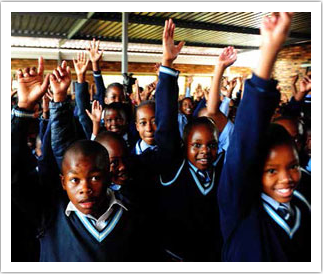 Basic Education Minister Angie Motshekga explained that LEAP, a British Council Initiative, would help with the development of learners’ literacy in any language. Learners would also get used to hearing English spoken with various accents.
Basic Education Minister Angie Motshekga explained that LEAP, a British Council Initiative, would help with the development of learners’ literacy in any language. Learners would also get used to hearing English spoken with various accents.
“These [listening and speaking] skills become even more important in the acquisition of a second language such as English in the South African context, where English effectively becomes the medium of instruction from Grade 4 onwards,” said the Minister.
Minister Motshekga said she personally struggled to understand English spoken by white people after completing her matric.
“I relied on reading to pass my modules. I had to tune my hearing to understand the accent. Sometimes that is what accounts for the failure of many first year students at universities,” she explained.
About 320 teachers in 150 schools in Mpumalanga, the Eastern Cape and KwaZulu-Natal have already received teaching and learning materials during the pilot phase of LEAP.
The Minister said improving literacy skills was one of the priorities of the current administration.
“We believe that this project will also cover the tasks outlined for education in the National Development Plan (NDP), which talks to forming partnerships to improve education quality and outcomes.”
She added that the ministry signed a declaration with the British Council in January this year, which helped improve the implementation of the Integrated Strategic Planning Framework for Teacher Education and Development in South Africa.
The teaching and learning audio material will not be too different from the current national curriculum, as it is linked to it.
“To complement the training package, teachers receive a training video, lesson plans and posters, and an extra SD card containing all the materials, so that they can access the materials on their cell phones, thus facilitating lesson planning at any time and location,” Minister Motshekga said.
The British Council Country Director for South Africa, Colm McGivern, said the council partnered with the department to promote quality education.
“This is a long-term strategic partnership with the department. We signed a five-year partnership agreement, through which we aim to improve learning of all languages in South Africa.”
He said the council had already received positive feedback from various beneficiaries of the project, including teachers who were not trained on how to use the MP3 players.
McGivern said monitoring and evaluation processes would be put in place to enable the council to measure the benefits for teachers and learners in a few years.
“By the end of our five-year partnership, we will ensure that we help the Department of Basic Education train all 400 000 teachers in South Africa in the better use of the material to improve the learning of all languages in the country."
Putting SA on the road to health
Putting SA on the road to health sadminIn the five months since the new administration came into office, Government has launched the pregnancy registry, increased the number of HIV positive people receiving antiretroviral (ARV) treatment and sent more students to study medicine in Cuba.
Increasing life expectancy
The National Development Plan (NDP) target states that by 2030 life expectancy would have reached 70, along with a generation of under-20-year olds who would be an HIV free generation.
It further states that the infant mortality rate would decline from 43 to 20 per 1 000 births. To achieve the targets stated in the NDP, Minister Motsoaledi announced during his Budget Vote that HIV positive people with a CD4 count of 500 and less would now be able to receive ARVs against the current CD4 count of less than 350.
This will be from January 2015. HIV positive pregnant women will also be put on lifelong treatment regardless of their CD4 count.
The Minister said all HIV positive pregnant women would be moved to the World Health Organisation’s option B+ as opposed to the current option B, that is operational in the country.
“Option B+ simply means every pregnant HIV positive woman goes on a lifelong treatment regardless of their CD4 status, whereas option B is that they stay on treatment only while breastfeeding, and stop after termination of breastfeeding if their CD4 count is more than 350. Option B+ is lifelong treatment regardless of CD4 status,” he explained.
Launch of MomConnect
To meet the goals of the NDP related to the infant mortality rate, Minister Motsoaledi launched MomConnect, which is an electronic SMS system that reminds pregnant women to attend their antenatal and postnatal classes.
Minister Motsoaledi said the messages would advise them on what to do at any stage of their pregnancy and also encourage women to start antenatal care at an early stage.
“We will say mom, since you registered with us you are now 13-weeks pregnant. This is what you must do, this is where you must go, and this is what you must avoid. Even after the birth of the baby, we will continue to send the messages for a period of one year. The messages will include advice on the baby,” explained Minister Motsoaledi.
How to register:
- Ask someone at a public healthcare facility to confirm that you are pregnant.
- Dial *134*550# from your cellphone to register and answer a few simple questions about your pregnancy.
- Pregnancy is registered in the national database.
Increasing the number of doctors in the country
The Gauteng Department of Health awarded 145 bursaries to young people to study medicine in Cuba.
The course comprises one year of Spanish and foundation courses; five years of medical studies and then two years of medical study at a South African University to complete a degree in medicine.
The KwaZulu-Natal Department of Health also sent 30 young people to the Manipal University in Jaipur, India, to study towards Bachelor of Pharmacy degrees and Bachelor of Science degrees in Medical Imaging Technology.
North West Health MEC Dr Magome Masike also bade farewell to 126 young people awarded bursaries to study medicine in Cuba.
He said the programme was in line with government’s rural development plan, which seeks to improve the general state of service delivery.
The MEC added that his department was contributing to this mandate by improving health services in rural areas.
“As government, we are hoping that the South Africa-Cuba Medical Programme will eventually assist us to improve our patientdoctor ratio. We need to see more doctors and specialists visiting our clinics and community health centres, where our people live.”
Bursary recipient Mmoloki Matlapeng, 19, from Bojanala, thanked the department for granting him and others the opportunity of a lifetime.
Matlapeng said when he was applying for a bursary, he was not only thinking about becoming a doctor. He said he was focused on how he was going to contribute and help the community that raised him.
“We are definitely not the first group to go to Cuba and we are not the last to go. We want to assure our parents and communities that we will do our best and will make them proud,” said Matlapeng.
All you need to know about endometriosis
All you need to know about endometriosis sadminOne in 10 women will develop endometriosis and 90 million women are estimated to be suffering from this disease worldwide.
Despite being a common disease, endometriosis is widely misunderstood and there are many myths about this condition.
What is endometriosis?
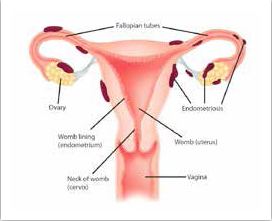 Endometriosis is a condition that involves a piece of the endometrium, the inner lining of the uterus, growing outside of the uterus and attaching itself to pelvic organs such as the ovaries, bladder and pelvic ligaments.
Endometriosis is a condition that involves a piece of the endometrium, the inner lining of the uterus, growing outside of the uterus and attaching itself to pelvic organs such as the ovaries, bladder and pelvic ligaments.
This displaced endometrial tissue then continues to survive and behaves as it normally would, by thickening, breaking down and bleeding during each menstrual cycle.
However, because this tissue has no way of exiting the body, it becomes trapped and forms patterns of tissue called endometriosis.
Depending on the location of the tissues, the depth to which they penetrate, their positioning in relation to other organs and tissues, and their size, these pieces of tissue can have completely different effects on patients.
What are the symptoms?
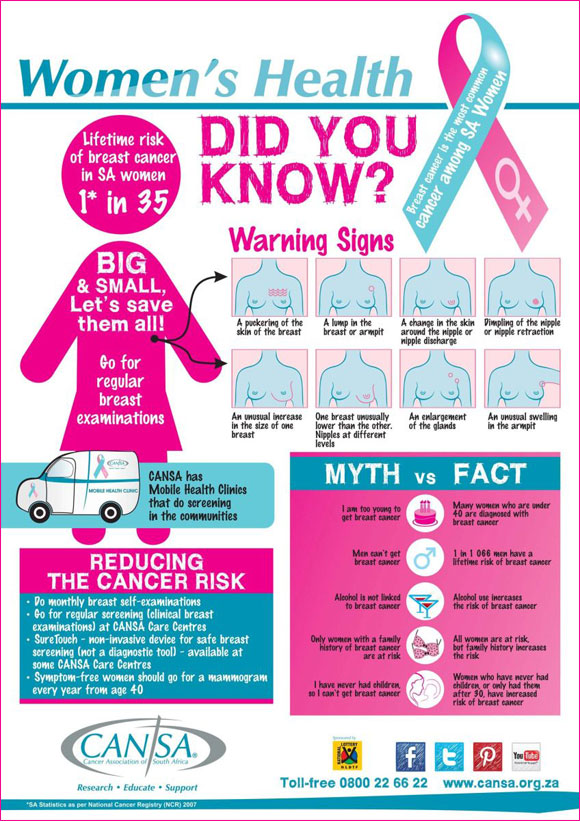
The most common symptom of endometriosis is a constant, aching pain that spreads to the abdomen, the pelvic region, the lower back and buttocks. Even the smallest growth can cause severe pain if it comes into contact with a nerve.
Other symptoms include heavy periods, painful sexual intercourse, severe menstrual pain, cramps, infertility and bowel and bladder problems. However, not all women suffer from regular symptoms meaning that many of them do not even realise they have the disease.
About 30 to 40 per cent of patients with endometriosis experience difficulties related to fertility.
The disease decreases a woman’s chances of falling pregnant by 12 to 36 per cent, depending on the progression of the disease, its location and the age of the patient.
Women should see a gynaecologist once a year for a check-up, but more visits are recommended should you be diagnosed with endometriosis.
If a woman’s pain increases dramatically in a short period of time, or she develops unexpected symptoms associated with menstruation or sexual activity, it is important to consult a medical professional as soon as possible.
If the pain is so severe that it affects a woman’s daily life, then she should definitely see a gynaecologist.
What is the treatment for endometriosis?
Endometriosis can never be completely cured, but the good news is that progress of the disease can be stopped and the symptoms treated. Treatment depends on how advanced the disease is, whether or not the patient wishes to have children, the severity of symptoms and the age of the patient.
If the disease is not causing any problems, the doctor may want to adopt a ‘wait and see’ strategy, leaving it to see if this condition will stay subdued. Alternatively painkillers, hormonal treatments, surgical treatments or a combination of therapies may be used.
Surgery aims to remove the endometrium pieces, cysts and adhesions as well as repair damage that may have been caused by the disease.
* Government Employee Medical Scheme
President makes Kensington a class act
President makes Kensington a class act sadminPresident Jacob Zuma unve i led the newl y refurbished Kensington High School in Cape Town recently as part of government’s Accelerated Schools Infrastructure Delivery Initiative (ASIDI) and the National Infrastructure Plan.
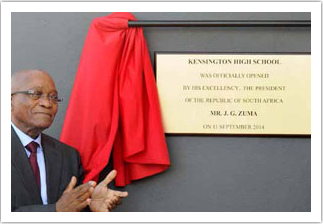 “Education is our apex priority as a country because we believe… it is the key to changing circumstances and changing the quality of life.
“Education is our apex priority as a country because we believe… it is the key to changing circumstances and changing the quality of life.
“I am very happy also to see that you are happy because you are in an environment that makes you proud and therefore prepares you to be better citizens tomorrow,” he told learners.
The President added that the school was an example of what could be achieved when national and provincial government came together to provide services.
“This is what we want to see throughout the country,” he said.
The President, who was welcomed by the school’s principal Trevor Jacobs, Basic Education Minister Angie Motshekga, Deputy Minister of Basic Education Enver Surty, Western Cape MEC Debbie Schäfer and Premier Helen Zille, was shown the school’s upgraded facilities and classrooms.
In the Grade 12 physical science class, Sesethu Kedama, 17, introduced her classmates to the President.
A light moment followed after the President asked what the class was working on. Sesethu paused, smiled and pointed to the chalkboard, showing the President a formula they were working on.
The school was first established in 1934 under the name Kensington Central and was located along Kensington Road in Maitland. At the time, the school accommodated Grades 4 – 8.
As the need for secondary education increased in the area, more classrooms were built and this led to the establishment of Kensington High School in 1951.
In 1974, the school moved from Maitland to a prefabricated building and its current location.
The school’s principal said he was happy that after the school was in an inadequate structure for many years, they have finally moved into a new school.
Over and above the science labs, the school also boasts two computer rooms equipped with uncapped ADSL.
School infrastructure
As part of the ASIDI initiative, the department has so far handed over 49 schools in the Eastern Cape between 17 July last year and August this year.
This was the second school that was opened in the province.
Deputy Minister Surty also unveiled a newly refurbished Die Duine Primary school in Lotus River recently.
As part of ASIDI in the province, the department will hand over 14 schools in the first phase, followed by another 11 schools.
The President said every child had the right to be educated, as highlighted in the Constitution and the Freedom Charter, and that the opening of the school showed the significance of the two very important documents.
“The official hand over of this state-of-theart school is living proof that we are on course to deliver to the people of the Republic. Our children should be taught in decent schools.
Our teachers should teach in decent schools. “It is for this reason that we have embarked on this programme to eradicate mud and plankie (wooden) schools,” he said.
President Zuma added that as part of the ASIDI programme, schools that previously lacked basic services had been attended and that over 200 schools had been given access to water, electricity and sanitation services recently.
The President also urged learners and teachers to respect the school’s infrastructure, adopt a culture of learning by starting classes on time and embracing a culture of reading.
Setting new standards in education
Setting new standards in education sadminThe Department of Basic Education (DBE) is improving South Africa’s standard of education by upgrading school infrastructure, increasing teacher development and improving mathematics and science results.
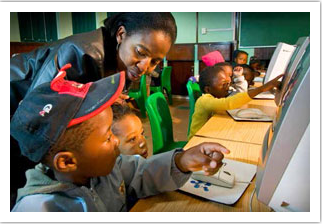 The department’s main priorities are to meet the mathematics, science and technology curriculum and assessment targets and ensure the continued increase in the number of passes in mathematics. The number increased from 121 970 in 2012 to 142 666 in 2013, a significant increase of 20 696.
The department’s main priorities are to meet the mathematics, science and technology curriculum and assessment targets and ensure the continued increase in the number of passes in mathematics. The number increased from 121 970 in 2012 to 142 666 in 2013, a significant increase of 20 696.
In physical science, there were 124 206 passes in 2013, which is 14 288 more than the 109 918 passes in 2012.
Infrastructure development
Some of the achievements that the DBE has recorded since the appointment of the new administration, include the development of a maths, science and technology directorate within the curriculum branch of the department.
This was done to ensure that there is a dedicated unit to implement the recommendations of a ministerial task team set up by the Minister.
A dedicated infrastructure directorate was also set up within the planning branch of the department to oversee and support ongoing infrastructure projects in the provinces. The directorate also oversees and ensures that provinces comply with the published norms and standards for school infrastructure.
So far, the Accelerated Schools Infrastructure Delivery Initiative has completed 70 schools in the Eastern Cape and four in the Western Cape.
Teacher development
A total of 140 fully functional teachertraining centres, 40 of which have full information communication technology resources provided by Vodacom, were established.
Quality and efficiency
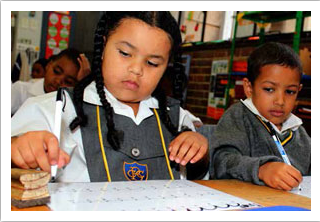 The Basic Education Minister Angie Motshekga has stressed that the key objective of this term is to improve the quality and efficiency of the entire education system.
The Basic Education Minister Angie Motshekga has stressed that the key objective of this term is to improve the quality and efficiency of the entire education system.
The department, through the provinces, continues to make significant strides in learner teacher support material delivery and have worked on systems that are better able to capture information and allow for resources to be adequately deployed.
The Minister has called on officials to work together to improve the education sector and take South African learners forward.
“Leaders are only as strong as the teams they have around them and the officials in positions of leadership at the DBE are certainly individuals capable of elevating the standard of education to a new level,” said Minister Motshekga.
Boost for black commercial farmers
Boost for black commercial farmers sadminFrom plans to build a multi-million rand training centre to the re-opening of land claims, the Department of Rural Development and Land Reform’s first five months of the new administration has been characterised by hard work.
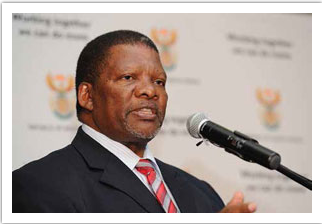 President Jacob Zuma signed the Restitution of Land Rights Amendment Act in June, which re-opened the restitution claim process, giving claimants five years, up until 2019, to lodge land claims.
President Jacob Zuma signed the Restitution of Land Rights Amendment Act in June, which re-opened the restitution claim process, giving claimants five years, up until 2019, to lodge land claims.
Rural Development and Land Reform Minister Gugile Nkwinti said the department consultated widely before re-opening of the land claims initiative.
The first period for lodgement was opened from 1994 to1998.
“Although land claims were made and settled, a great number of people complained that they had not been aware of the process at the time and as such they had missed the initial lodgement window,” the Minister explained.
After the process was re-opened by the end of July this year, a total of 5 495 claims had been received at various lodgement sites across the country. The majority of these have been lodged in the Western Cape with 1 363 claims, followed by 956 claims in Gauteng.
Chief Land Claims Commissioner Nomfundo Gobodo said: “We have noted that the majority of those who have lodged claims since the re-opening of the lodgement of land claims have opted for financial compensation.”
She encouraged claimants choose land restoration instead of money, where possible, because it would address the important issue of land ownership patterns in South Africa.
The department is planning to send mobile offices to rural areas across the country to enable every qualifying citizen an opportunity to lodge their claims. The department will target mostly elderly people and areas where transport is a problem.
Multi-purpose centre
The department, in partnership with the Agricultural Research Council (ARC), unveiled plans to build a R60 million multi-purpose training and development centre that will give up-and-coming black commercial farmers a boost.
“With this new multi-million rand facility, our objective will be to rekindle that class of commercial farmers destroyed by the Native Land Act,” the Minister explained.
ARC CEO Dr Shadrack Moephuli said the centre, which is in Roodeplaat north of Pretoria, will also help his institution to develop farmers who can respond to the needs of customers.
“We will provide them with the training so that they can be productive themselves, understand the use of technology, how to respond to the needs of consumers, but also how to ensure to identify the diseases at their respective farms and solve the problems on their own,” he said
Putting farmworkers first
Putting farmworkers first sadminFarmworkers should be first in line for consideration when it came to the redistribution of farmland and their contribution to the agricultural sector should also be recognised.
These are the sentiments of Minister of Rural Development and Land Reform Gugile Nkwinti at the recent National Land Tenure Summit in Gauteng.
“In redistribution, I want to put workers first. I want workers to benefit because they work the land,” he said.
It was not right that people who “broke their backs” in farms had nothing, the Minister added.
“We want to address this, given that the farmworkers have made contributions in these farms. We need to look at how we reward them with ownership.
“We will buy the land and redistribute it. And the first people we will consider for that redistribution are the workers on the land, before we bring in anybody from elsewhere… We have to recognise their contribution to the development of the agricultural sector in our country.”
The Minister said he was encouraged by people’s views on the department’s policies, especially the Strengthening the Relative Rights of People Working the Land proposal, which has become commonly known as the 50-50 policy.
He said that those who are opposed to the 50-50 policy had been given three years to come up with alternatives but they failed to do so.
According to Minister Nkwinti, 437 commercial farmers were already helping the department to train workers and emerging farmers for a period of five years.
*Lungelo Mkamba works for the Department of Rural Development.
Narysec participant goes above and beyond
Narysec participant goes above and beyond sadminAlthough the National Rural Youth Services Corps (Narysec) participants’ contracts expired at the end of August 2014, Samukelisiwe Khumalo, 28, continues to serve her local community.
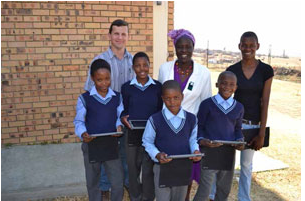 Khumalo was part of a group of young people who went through the Department of Rural Development and Land Reform’s (DRDLR) Narysec programme for four years, where they were equipped with skills.
Khumalo was part of a group of young people who went through the Department of Rural Development and Land Reform’s (DRDLR) Narysec programme for four years, where they were equipped with skills.
As part of the DRDLR’s iSchool Africa iPad Learning Programme, a junior facilitator development programme was introduced based on the Comprehensive Rural Development Programme model.
The main goal of this initiative is to develop a cadre of local rural youth who will go on to champion the department’s iSchool Africa iPad Learning Programme and ensure long-term sustainability. A key focus of the programme is capacity building and skills transfer.
Khumalo, who is from Siyazenzela Township, Mpumalanga is a junior facilitator and helps teachers and pupils at the local Vukuzenzele Combined School.
The facilitator works with teachers in the classroom, ensuring on-going professional development and skills transfer.
Everyday Khumalo arrives at school every morning at 8am. She goes to the staff room first and checks on the iPads to see if any of them need to be charged. After that, she checks the schedule to see which educator will need the gadgets for the I-school lessons.
“I help the educator to set up before the lessons start and I also help with starting and executing projects in the classrooms,” said Khumalo.
The principal of the school, TE Mudau, was full of praise for Humalog’s dedication and commitment to the school.
“We wish there was a way to retain her in the Narysec programme, especially since the stipend was her only source of income,” said Mudau.
The school has a total of 1 357 learners and each one of them is exposed to this unconventional method of learning using iPads.
Mudau’s school received a donation of 50 computers from a local mining company.
*Zithini Dlamini works at the Department of Rural Development in Mpumalanga.
Making South Africa safer
Making South Africa safer sadminMinister of Police Nkosinathi Nhleko has been working hard to ensure that South Africans feel safe.
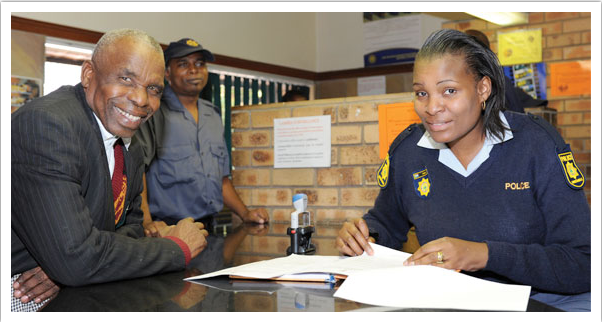 Minister Nhleko recently officially opened a R68 million state-ofthe- art police station, Tembisa South Police Station, in Ekurhuleni, Gauteng, to give the fight against crime a boost.
Minister Nhleko recently officially opened a R68 million state-ofthe- art police station, Tembisa South Police Station, in Ekurhuleni, Gauteng, to give the fight against crime a boost.
He urged the community to work with the police to tackle crime.
“We all need to play a role in the fight against crime to ensure that our communities are safe and protected,” the Minister stressed.
He appealed to community members to report criminal activities and those involved in such acts.
“Criminals are in our communities and they must be exposed.”
Minister Nhleko encouraged the local residents to establish Community Policing Forums in their areas, saying such structures were important in the fight against crime.
Interaction
Minister Nhleko’s focus is also on changing the negative image that the public has of South African Police Service (SAPS).
This will be done through continuous interaction between the SAPS and communities around the country.
“You can only improve the image of the police if members of the community who are recipients of the service of the police are absolutely clear about them knowing the police service much better,” the Minister said.
Another aspect of improving interaction between the public and the police will be the launch of a front line service delivery programme.
“As a member of the community you should be treated with respect and dignity and also a service must be rendered.
“The question of being diligent on the side of the police is also going to be a focal point. We will run this as a project on how we can improve the image of the police,” he said.
Another top priority for Minister Nhleko is working on a recruitment strategy to attract young people, who have integrity, to SAPS.
“We have started rolling out a community based recruitment strategy. We are also saying to members of the community at a local level make an input to who should join the SAPS family,” the Minister said.
Recently members of the Hawks and Crime Intelligence arrested 23 SAPS officials from the Free State for charges related to defeating the ends of justice, theft, corruption, and money laundering.
“We will continue to deal with this [corruption]. This is a negative element and the key thing is how do we deal with it. The community recruitment is part of mitigating the process,” he added.
With the festive season upon us, Minister Nhleko said there needed to be better planning and coordination when combating violent crimes.
To deal with the rise in robberies that usually occurs over the holidays, the Minister intelligence- driven would be the focus of police.
Police intelligence would be beefed up to combat violent crime.
Crime tip-offs lead to over 3 000 arrests
Crime tip-offs lead to over 3 000 arrests sadminMore than 3 000 arrests have been made during 2007 and 2014 as a direct result of tipoffs received through Crime Stop and Crime Line combined.
National Police Commissioner Riah Phiyega made the announcement during the signing of a renewed memorandum of understanding (MOU) between the South African Police Service (SAPS) and Primedia.
In 2007, SAPS and the Primedia Group entered into a MOU through which Crime Line, the anonymous tip-off line, was formed.
Crime Line receives tip-offs on criminal activities from members of the public, which are then sent through to the SAPS’s Crime Stop for further action.
Commissioner Phiyega, said the updated and renewed MOU would strengthen the partnership and re-invigorated efforts to tackle the criminal element, in unity.
She said the relationship between the two entities has grown over the past seven years.
Commissioner Phiyega said, to date, over R56 million worth of illegal or unlawfully obtained property and goods have been seized.
“In addition, as a result of the Drug Watch campaign conducted in Gauteng and the Western Cape, approximately 30 000 people have been taken into custody.
“Under the electricity theft campaign, Operation Khanyisa, 2 829 Eskom cases have been solved,” she said.
Commissioner Phiyega, thanked all whistle blowers and police officers for their part in the fight against crime.
“Let’s not forget that sometimes responding to an anonymous tip-off can be just as, if not more, dangerous than responding to, for example, a bank robbery in progress because you have no idea what is awaiting you at that house, in that car in that isolated area.”
She urged whistle blowers to report on the brutal murder of police officers as well as corrupt police officers, who are involved in criminal activity via the Crime Stop or Crime Line numbers.
Head of Crime Line Yusuf Abramjee reiterated that police needed communities to be their eyes and ears, while the communities need the police to act on their information and place criminals behind bars.
“This model is being used successfully all over the world, but it is without a doubt that South Africa is leading the way. We are planning to take this model to all parts of our continent,” he said.
Bringing justice closer to the people
Bringing justice closer to the people sadminThe new Sexual Offences Court in Bethlehem, Free State, will go a long way in providing muchneeded protection to survivors of sexual crimes in the area.
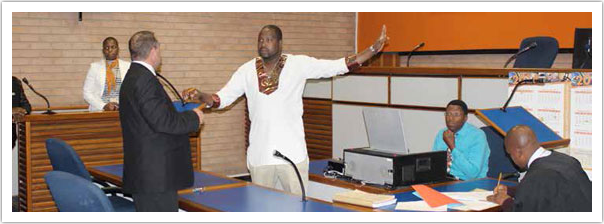 The new court will also help boost the community’s confidence in the criminal justice processes.
The new court will also help boost the community’s confidence in the criminal justice processes.
The dedicated Sexual Offences Court - located at the Bethlehem Magistrate’s Court - was opened by Minister of Justice and Correctional Services Michael Masutha recently.
Community members hope the court will help victims, who are often have to deal with long delays before cases are finalised.
Petronela Mekoa, 43, said the real trauma for rape survivors was enduring lengthy court process.
She shared her experience of supporting a rape survivor through normal court proceedings.
“It was very difficult to testify even for her as an adult. There were males in the courtroom - from the magistrate, the policemen… and having to relive the incident in such an environment was embarrassing for the victim,” said Mekoa.
Her hope is that the dedicated court would reduce trauma for victims, and make them feel more protected.
Thabiso Mofokeng, 28, said the court should be adequately staffed and sustainable to make a significant impact on the levels of violence against women in the area.
“I hope it will make a difference, taking into account the number of convictions of rapes we hear of in the area. I also hope it will improve the skills of court personnel, which has contributed to the efficient prosecution and adjudication of some cases,” he said.
Another community member, Mimiki Mphuthu, 37, said the court would ensure that perpetrators were put behind bars.
Police have crime under control
Police have crime under control sadminWhile challenges with certain categories of crime remain, South Africa’s police have a firm handle on crime, says National Police Commissioner General Riah Phiyega.
 “Police are in control. The fact that we arrested 1,7 million people in the past year alone says a lot. Policing is a highly controlled environment with clear standing orders.
“Police are in control. The fact that we arrested 1,7 million people in the past year alone says a lot. Policing is a highly controlled environment with clear standing orders.
“Yes, mistakes are made but they tend to be the ones that are flagged by the media,” said Phiyega following the release of 2013/14 crime statistics last month.
The statistics, which cover the period from 1 April 2013 to 31 March 2014, showed that murder is up by 5 per cent, with an additional 809 murders.
The Western Cape showed the highest increase in murders by 12,8 per cent, from 2 580 in 2012/13 to 2 909 in 2013/14, followed by Gauteng by 11,2 per cent, from 2 997 in 2012/13 to 3 333 in 2013/14.
 The third highest province in cases of murder was the Northern Cape with a record of 6,3 per cent, from 412 in 2012/13 to 438 in 2013/14.
The third highest province in cases of murder was the Northern Cape with a record of 6,3 per cent, from 412 in 2012/13 to 438 in 2013/14.
The statistics also showed that sexual offences have decreased by 5,6 per cent from 2012/13 to 2013/14.
The decrease was recorded in all nine provinces, with the North West leading with a 12,2 per cent decrease, from 5 521 in 2012/13 to 4 850 in 2013/14.
Gauteng showed a decrease of 10,3 per cent from 12 288 in 2012/13 to 11 021 in 2013/14, followed by Free State with 8,3 per cent from 5 252 in 2012/13 to 4 814 in 2013/14.
In addition, home robbery was up 7,4 per cent, with 1 334 more cases than the previous year.
Business robbery was up by 13,7 per cent with 2 238 more attacks, and car hijacking up by 12,3 per cent with 1 231 more attacks than the previous year.
Theft of motor vehicles and motorcycles in KwaZulu-Natal decreased by 10,9 per cent, from 9 788 in 2012/13 as compared to 8 723 in 2013/14.
Theft of motor vehicles and motorcycles in KwaZulu-Natal decreased by 10,9 per cent, from 9 788 in 2012/13 as compared to 8 723 in 2013/14.
Police Minister Nkosinathi Nhleko said crime statistics were all about numbers and how research was conducted.
 “The problem with how South Africans deal with crime statistics is that the debate has degenerated to being about numbers and research methodology. Energy needs to be diverted towards what is it that needs to be done to improve levels of safety as a country.
“The problem with how South Africans deal with crime statistics is that the debate has degenerated to being about numbers and research methodology. Energy needs to be diverted towards what is it that needs to be done to improve levels of safety as a country.
“This is the major point that needs to be looked into. The important thing is can a ordinary South African walk down the street any time of the day and still feel safe?”
He said the crime statistics were audited by the Auditor-General, working in conjunction with Statistics South Africa.
This, Minister Nhleko said, was done to address concerns about the reliability of the statistics, which were raised last year.
He said when levels of poverty and unemployment were high, crime statistics were bound to rise.
He also attributed this to the high social unrest as well as drug abuse in communities.
“The prevalence of drug and alcohol abuse in South Africa is very concerning. In most areas of our communities, we find more taverns than schools and churches combined,” he said, adding that a broader solution needs to be found.
"There is a need to regenerate the morality in our society, which will help us in the fight against crime."
All of us need to make a contribution in reducing crime and fighting corruption in our communities... ~ Minister Nkosinathi Nhleko.
 Currently, South Africa has one police officer for every 346 South Africans.
Currently, South Africa has one police officer for every 346 South Africans.
"All of us need to make a contribution in reducing crime and fighting corruption in our communities," said Minister Nhleko.
He added that sexual offences still needed to be tackled by all responsible citizens of South Africa.
“The decrease in sexual offences crime does not suggest that no incidents of rape were occurring, they still do exist.”
He added that contact crimes were prevalent in society and there were high levels of violence and aggression, which was a serious concern.
He said in line with the National Development Plan, the focus would be on strengthening the criminal justice system, professionalising the police as well as building safety.
Women's pig business brings home the bacon
Women's pig business brings home the bacon sadminWhen the Department of Agriculture paid out villagers of Flagstaff in the Eastern Cape for their pigs that were culled due to swine flu, in 2008 a group of women decided to use this money to start Zithulele Piggery Cooperative.
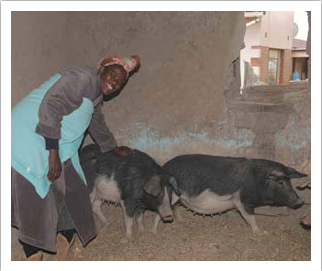 “We thought it was a good idea to take the money that we had received from pigs that were culled to buy more pigs and start a business. Only this time we would take care of the pigs with regular vaccination, proper food and keep them in a confined environment,” said Nosapo Masombothi, who is a member of the cooperative.
“We thought it was a good idea to take the money that we had received from pigs that were culled to buy more pigs and start a business. Only this time we would take care of the pigs with regular vaccination, proper food and keep them in a confined environment,” said Nosapo Masombothi, who is a member of the cooperative.
In 2006, parts of South Africa were faced with a swine flu outbreak believed to come from pigs.
According to the Department of Agriculture, an intensive campaign was launched to combat the outbreak in the province by culling large numbers of infected pigs and compensating the owners.
Zithulele Piggery was founded from this, and it is run by five women who have 16 pigs. Masombothi says she loves farming and believes it has the potential to create job opportunities in the area.
“When we started our business we initially had about 30 pigs. Since then we’ve managed to sell to the local community and local butchers.”
The price for each pig ranges from R250 to R1 000 depending on the size.
A typical day for members of the cooperative begins with checking whether the pigs are fed as per their schedule, administering vaccinations on certain days and other members going out to market the business to potential buyers.
Masombothi, a former shopkeeper, says they have big plans for the business, which include buying more pigs and supplying bigger companies.
She adds that the agricultural sector is a key for development in any village.
“It is up to us as local people to look after ourselves and create our own jobs. This country has come very far in terms of our democracy and development in general. We now have a lot of opportunities that were not there in the past. It’s up to every South African to grab those opportunities.”
The cooperative also received support from the Ingquza Hill Municipality with information on how to start and run a business.
Ingquza Hill Municipality’s Director for Planning and Development Owethu Pantshwa, said Zithulele Piggery received training and mentor-ship facilitated by the municipality.
“There is a need for local people to open various forms of businesses. On a quarterly basis we sit with all local small, medium and micro enterprises for information sharing sessions and we also advise them of the opportunities available”.
"We encourage local people to open businesses due to the huge unemployment rate and also given the potential the area has for agriculture, forestry and tourism," Pantswa said.
According to the Department of Agriculture Forestry and Fisheries, the South African pork industry contributed to around 2,15 per cent to the agricultural sector in 2012.
The gross value of production of pork is dependent on the quantity produced and the price received by farmers.
Growing the community brick by brick
Growing the community brick by brick sadminAfter struggling to find work, 11 people f rom Ga-Chuene village in Limpopo decided to form Baitapishi Brickmaking Cooperative and supply the local community.
The group is made up of five women and six men.
“We realised that making bricks had potential for growth and could help us to earn money. Making bricks is hard work but the good thing about them is they are not perishable, like food, meaning they last longer,” says chairperson of the cooperative Magdeline Mashiane.
The business started in 2004, and they approached the Limpopo Economic Development Agency for assistance.
“The organisation bought us a TLB machine to help with the day-to-day running of the business.”
A typical day at Baitapishi Brickmaking begins at 8:00 in the morning when all members of the cooperative have different roles to play in the business.
“We have people that are in manufacturing, marking the finances – each person has a responsibility.”
The price range for a batch of bricks is from R350 to R480 depending on the size and type of bricks.
She adds that at times the business does encounter difficulty especially when business is slow.
“Sometimes we go up to eight months without payment, but it's part of being in business.”
She adds that they have big plans for the business, which include making bricks for low-cost housing for the community, which are built by the government and involving young people in the business.
“We would like to secure a licence with the South African Bureau of Standard so we can supply to big companies.”
Minister of Small Business Development Lindiwe Zulu, who visited Baitaphishi Cooperative during International Cooperatives Day, said there is still a lot of work to be done for the cooperative to grow.
Minister Zulu also added that Baitaphishi needed to visit a bigger brickmaking company to learn how to run their business sufficiently.
EPWP is changing the lives of young people
EPWP is changing the lives of young people sadminThe Extended Public Works Programme (EPWP) is making a positive impact on the lives of young people across the country, and remains a key programme of government to alleviate poverty and create employment.
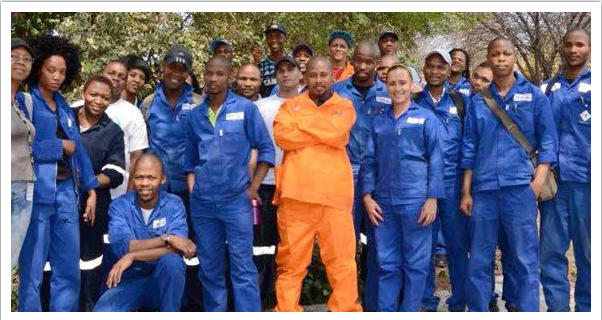 “The EPWP remains the key government programme that strives to uplift the socioeconomic status of the poor and unemployed. It also seeks to provide opportunities for basic training to new job seekers and in some cases newly qualified young people.
“The EPWP remains the key government programme that strives to uplift the socioeconomic status of the poor and unemployed. It also seeks to provide opportunities for basic training to new job seekers and in some cases newly qualified young people.
“We are delighted with the cooperation that the EPWP enjoys with a number of stakeholders from municipalities, provincial and national departments, as well as civil society organisations. We are also equally pleased by the positive impact that the EPWP has made on the lives of many families across the country.”
Among the many lives that have been changed positively by the EPWP are those of three Northern Cape young people.
Twenty-six-year old Alromanus Boyes from Springbok matriculated in 2004 and enrolled for the EPWP in 2011. He completed his Artisan Development Programme training in 2013 and has since been employed on contract at the Nuclear Corporation of South Africa.
“It was difficult but I didn't give up. I advise other young, unemployed people to take note of any opportunity that arises as that has helped me to be where I am today,” he added. Pearl Rainers, 22, from Springbok who matriculated in 2008 and passed her artisan trade test in July 2013, says the EPWP has given her a chance to do what she loves.
“I really love the work that I am doing and I abide by the timelines.” She intends to study further within the artisan industry.
Ross Marving, 32, from Keimoes, says the programme is a good initiative.
“The EPWP provides skills development to the unemployed and reduces poverty.
“I am very happy to be part of this programme as it has made my dreams come true," says Marving.
His vision is to further his studies within the artisan industry.
Highlights of the EPWP Phase 2 include:
- The incentive grant model was revised to give rural municipalities easier access to grants in order to increase labour intensive work opportunities through the EPWP projects.
- The Programme reached its target for women and youth participating in the programme, with 60 per cent of the participants being women and 50 per cent being youth, compared to the targets of 55 per cent women and 40 per cent youth.
- All 278 municipalities across the country have signed protocol agreements, committing them to achieve their EPWP targets.
- The government has collaborated with civil society organisations to create work opportunities and provide services at grassroots level.
Fund to benefit youth in North West
Fund to benefit youth in North West sadminA three-way partnership between entities of government is set to benefit youth-owned businesses in the North West Province.
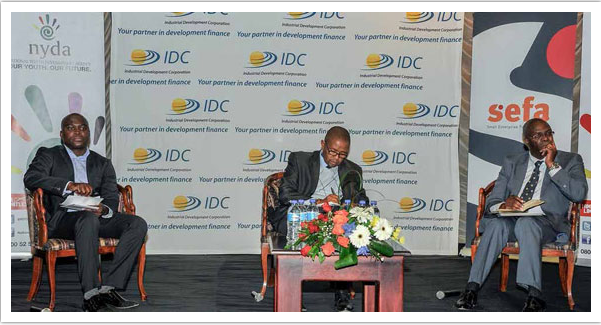 The Industrial Development Corporation (IDC), Small Enterprise Finance Agency (SEFA) and the National Youth Development Agency (NYDA) have teamed up to fund to youth-owned businesses.
The Industrial Development Corporation (IDC), Small Enterprise Finance Agency (SEFA) and the National Youth Development Agency (NYDA) have teamed up to fund to youth-owned businesses.
The launch of the youth fund follows the signing of the Youth Accord in 2013 between government and its social partners.
NYDA Chief Executive Officer Khathu Ramukumba says the fund will help young entrepreneurs start their businesses and help government to fight the triple challenges of poverty, inequality and unemployment.
“Often young aspiring entrepreneurs are rendered ineligible for finance due to their financial backgrounds coupled with stringent funding criteria and we hope that this funding will help them to achieve their dreams of starting their own businesses,” says Ramukumba.
IDC Chief Executive Officer Geoffrey Qhena urged the young people of the North West to become agents of change in their communities by taking advantage of the services and the funds made available by the three entities.
“For us to achieve our mandate, we need you as entrepreneurs to come on board by developing sustainable businesses because if they are sustainable, the jobs they create will also be sustainable.
“This is an opportunity to partner with us because we want to give you this opportunity to create employment for the betterment of this country,” he said.
In 2012, SEFA, a 100% IDC-owned agency, was set up to help small businesses and co-operatives seeking funding of up to R5 million.
”Our partnership with IDC and NYDA is a catalyst for the development of viable youth entrepreneurship. Through this collaboration we continuously seek to assist and to empower the youth by giving them business support and access to finance.
“We further encourage young entrepreneurs to venture into the productive sectors of the economy,” says SEFA chief executive Thakhani Makhuvha.
Young entrepreneur and owner of Curve Behind Trading, Lebogang Masilo from Mogwase, says the partnership between the three agencies will be useful.
“I think this partnership will be helpful especially to us as young entrepreneurs because sometimes we struggle with funding and drawing up a business plan.”
Masilo started and registered his construction company in 2010 after attending various short courses in business management offered by the NYDA.
Director of Operations at Ecolution Nkosana Mtimkulu, a 100% youth-owned company producing charcoal, says he hopes to get funding and increase his business because at times demand exceeds supply.
Regional Manager of the IDC in the North West David McGluva said the partnership between the three entities would have a positive impact.
“If you pull together in one direction, there is a greater chance of you making a bigger impact.” The NYDA will screen and recommend young entrepreneurs to access funding offered by the IDC and SEFA.
NYDA funds all things chicken
NYDA funds all things chicken sadminPontsho Senne, proud owner of All Things Chicken, situated in Phokeng, 5 kms from Rustenburg, has watched her business grow from strength to strength since it started in 2012.
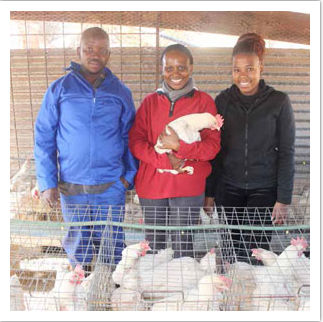 Senne, a former administration assistant, started her business after her husband bought 1 000 broiler chicks to start a chicken breeding business.
Senne, a former administration assistant, started her business after her husband bought 1 000 broiler chicks to start a chicken breeding business.
“I had to learn how to take care of the chicks on the spot and used the internet as my source of information,” said Senne.
When Senne started her business she and a partner used their savings to buy equipment. The partner has since left the business and Senne is the sole owner.
All Things Chicken, which specialises in leghorn (hard body), purchase their stock from egg farms, and negotiate with the farmers to sell them retired egg-layers.
“Cash flow and negotiating with the suppliers can be very hard as we at times do not agree on pricing,” she said.
The business slaughters, packages and sells their product to the local community of Phokeng.
“We also supply two local butcheries, caterers and the old ladies who sell afval on the street corners,” said Senne.
The company has a small bakkie which is used to collect stock and distribute to their clients.
Senne approached the National Youth Development Agency (NYDA) for grant funding amounting to R49 970,21 to purchase equipment
“With the grant received from the NYDA we managed to buy a chicken plucker, crates and stock,” said Senne.
The plucker has made production easier as they are now able to pluck six chickens at a time instead of one.
“The NYDA has not only supported the us financially, but has also assisted the company with entrepreneurial skills training and branding,” said Senne.
Chairperson of the NYDA Yershen Pillay says young South Africans are extremely resourceful and that it’s up to the NYDA to provide the necessary support.
“We are exceptionally proud of our grant beneficiaries and wish the entire team at All Things Chicken every success in growing their business and in so doing further developing the economy of South Africa,” said Pillay.
The company currently has three machines which make production quick and easy.
“We have a stunner and bleeder, a scouldering tank and a de-feathering machine which speeds up production,” said Senne.
The business sells live chickens priced at R40, slaughtered chickens priced at R45, and afval priced at R20.
“Month-end is busy for us as there is increased demand for our products and that’s when we generate more income,” said Senne.
All Things Chicken does its marketing through word of mouth and flyers which Senne distributes herself.
The company has seven female casual employees that go to work during the slaughtering and packaging weeks.
“The business has the potential of growing, and my dream now is to open an abattoir. I see my business supplying to large supermarkets one day,” said Senne.
Senne encourages other young people to start their own business and create employment.
Jobs: Department of Social Development
Jobs: Department of Social Development sadmin CHIEF DIRECTOR: HIV/AIDS and Burdens of Diaseases
CHIEF DIRECTOR: HIV/AIDS and Burdens of Diaseases
BRANCH: Integrated Development
TOTAL PACKAGE: R988 152 per annum
This inclusive remuneration package consists of a basic salary, the states’ contribution to the Government Employees Pension Fund and a flexible portion that may be structured i.t.o. the applicable rules.
REQUIREMENTS:
An appropriate Degree or equivalent qualification PLUS 5-10 years senior management experience in implementing HIV and AIDS, TB and other burdens of diseases programmes or in the relevant field. A relevant post-graduate Degree in will be an added advantage. Knowledge of the public service legislation. Knowledge and understanding of the HIV and AIDS national strategy as contained in the National Strategic Plan for HIV/AIDS, STI and TB. Knowledge of HIV/AIDS, TB and other burdens of diseases in a Social and economic context. Knowledge and understanding of human behavior and social system. Knowledge and understanding of Social Development policies and programmes pertaining to HIV and AIDS, TB and other burdens of diseases.
Competencies needed
Strategic capability and leadership skills. Programme and Project management skills. Financial management skills. Policy analysis and development skills. Information and knowledge management skills. Communication (written and verbal) skills. Service delivery innovation skills. Problem solving and change management skills. People management and empowerment skills. Client orientation and customer focus skills. Stakeholder management skills. Presentation and facilitation skills. Research skills. Monitoring and evaluation skills.
Personal attributes
Confidentiality. Ability to work under pressure. Innovative and creative. Ability to work in a team and independently. Adaptability. Diplomatic. Independent thinker. Cost consciousness. Honesty and integrity. Assertiveness.
KEY RESPONSIBILITIES:
Provide strategic direction in the review and development of the legislative framework (policies, norms and standards, strategies, guidelines and programmes) to guide the implementation of and the relevant Social Development strategies and programmes in line with the National Strategic Plan for HIV, STI and TB. Lead the implementation of the Comprehensive Strategy in addressing the social and structural drivers of HIV and TB and other burdens of diseases across the public service. Lead the implementation of Home and Community Based Care and support programs including the strengthening of community system for ensuring community response. Ensure the alignment of the behavioral change, prevention and care and support strategies with other social development programmes to strengthen community and family systems. Manage the implementation of National Action Plan in mitigating the impact of HIV/AIDS and TB on key populations including women, people with disabilities, vulnerable children and youth as well as older persons. Lead and collaborate with other government departments, SANAC structures and relevant stakeholders in ensuring the implementation of behavioral change, prevention and response mechanisms in relation to social drivers of HIV and AIDS, TB and other burdens of diseases. Lead and oversee the design and implementation of quality assurance and monitoring framework to ensure compliance to policies, norms and standards and oversee research and impact of the implementation thereof. Provide overall management of the Chief Directorate.
ENQUIRIES:
Mr P Netshipale Tel: (012) 312-7662
APPLICATIONS TO BE FORWARDED TO:
The Director General, Department of Social Development, Private Bag X901, Pretoria, 0001. Physical Address: HSRC Building, 134 Pretorius Street , Pretoria.
FOR ATTENTION:
Ms E de Waal
CLOSING DATE:
31 October 2014
NOTE
A curriculum vitae with a detailed description of duties, the names of two referees, certified copies of qualifications and identity document must accompany your signed application for employment (Z83). Shortlisted candidates for SMS posts will be required to undergo competence assessment. The successful candidate will sign an annual performance agreement, complete a financial disclosure form and also be required to undergo a security clearance. If the candidate is applying for an OSD post, certificates of service must be attached to the CV. No faxed or e-mailed applications will be considered. It is the applicant’s responsibility to have foreign qualifications evaluated by the South African Qualification Authority (SAQA). Failure to submit the requested documents will result in your application not being considered. Personnel suitability checks will be conducted on short listed candidates and the appointment is subject to positive outcomes of the checks. Correspondence will be limited to shortlisted candidates only. If you have not been contacted within three months after the closing date of this advertisement, please accept that your application was unsuccessful. “The Department of Social Development supports persons with disabilities”.
It is our intention to promote representivity (race, gender and disability) in the Public Service through the filling of this post and candidates whose transfer / promotion/ appointment will promote representivity will receive preference.
Jobs: Government Communication and Information System
Jobs: Government Communication and Information System sadminPOST: Assistant Director: Writer
DIRECTORATE: Vuk’uzenzele
SALARY: R270 804 (Excluding benefits)
CENTRE: Pretoria
REF NUMBER: ASDVUK2014
The Government Communication & Information System (GCIS) wishes to appoint writers to initiate and produce content for a range of GCIS communications platforms, among which the monthly newspaper, Vuk’uzenzele, and the monthly Public Sector Manager (PSM) Magazine are principal channels.
The successful candidates will be energetic, creative and organised news “junkies” with a proven record in writing for print and online medium. The successful candidates will be passionate about the programme of the South African government, especially as it relates to those South Africans who depend on government information and services for their well-being. The ideal candidates will be equally comfortable producing hard news stories, news features, colour pieces, comment and analysis.
REQUIREMENTS
Qualifications:
An appropriate three-year degree or equivalent qualifi cation in Journalism.
Experience:
Proven record of writing for print and online platforms for at least three years. Technical knowledge and experience of the process of news-gathering and writing. Thorough, broad and upto- date knowledge of the news publishing environment. Journalism experience in print and online media, with broadcast experience as an optional advantage. Ability to do minimal sub-editing of own copy and other colleagues. Ability to write analysis and feature articles as well as news for Vuk’uzenzele Newspaper and Public Sector Manager (PSM) Magazine on a monthly basis. Ability to solicit content and liaise with various information providers of levels. Ability to source and write well-researched articles in a fast-paced environment. Ability to come up with own story ideas and contribute to the news diaries for the two publications. Ability to translate government policy and outlook into magazine packages that will be relevant to roles played by Public Sector managers in implementing government programmes. Ability to select stories of local, national and international relevance for Vuk’uzenzele and PSM Magazine.
Skills:
The ideal candidates will be able to work under pressure and respect set deadlines. Excellent command of the English language, grammar and construction and understands the requirements for effective writing. Ability to use modern electronic systems to convey information: specifically Microsoft Word and Adobe PageMaker or InDesign for the PC. Excellent interpersonal, communication and interviewing skills. Ability to use Social Media platform(s) as part communication and information dissemination channel. Willingness to work irregular hours, on weekends and public holidays. A valid driver’s licence is essential.
Duties:
Professional writing (both print and electronic forms) for Vuk’uzenzele and Public Sector Manager magazine. Ensure that written articles meet the needs of targeted audiences and deadlines for publications. Contribute towards generation of story ideas for content plans across the business unit. Writing comprehensive news articles and features on government programmes and policies. Sourcing and gather newsworthy articles for Vuk’uzenzele and Public Sector Manager magazine. Actively participate in the editorial meetings and meet with other writers regularly to discuss leads, angles and compare notes about the stories. Liaise regularly with editors.
ENQUIRIES:
Ms D Simpson
Tel: (012) 473 0065
CLOSING DATE: 24 October 2014
GCIS is an equal opportunity employer. Applications must be submitted on Form Z83, obtainable from any Public Service department and be accompanied by a comprehensive CV and certifi ed copies of qualifi cations, driver’s license and ID document. (Failure to comply with these requirements will result in the application being disqualifi ed). Suitable candidates will be subjected to a personnel suitability check (criminal record, citizenship, credit record checks, qualifi cation verifi cation and employment verifi cation). The successful candidate must disclose to the CEO particulars of all registrable fi nancial interests”. Applicants with disabilities are encouraged to apply.
Applications should be directed to: The CEO, Government Communication and Information System, Private Bag X745, Pretoria, 0001, for attention: Mr S Matshageng; or hand deliver to: 1035 Tshedimosetso House, Frances Baard Street. Visit our website for more positions in the organisation. Correspondence will be limited to successful candidates only. If you have not been contacted within one month after the closing date of this advertisement, please accept that your application was unsuccessful.
Protecting the rights of SA’s vulnerable
Protecting the rights of SA’s vulnerable sadminWhen the Minister of Social Development Bathabile Dlamini delivered her Budget Vote earlier this year, she declared the 2014/15 as the year to protect the rights of people with disabilities.
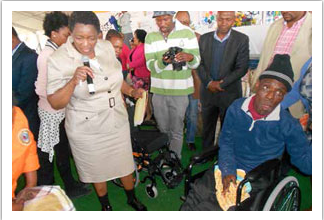 The department is also on a mission to help child-and youth-headed houses, support victims of violence, and handing a lifeline to millions of South Africans through social grants.
The department is also on a mission to help child-and youth-headed houses, support victims of violence, and handing a lifeline to millions of South Africans through social grants.
Vuk’uzenzele looks at some of the department’s highlights and programmes.
Protecting the rights of people with disabilities
Minister Dlamini has appointed a committee to tackle the human rights challenges facing people with disabilities in the country.
The newly appointed committee will consist of representatives from organisations representing people with disabilities, such as the Department of Social Development (DSD), South African Social Security Agency (SASSA) officials, the National Development Agency and the South African National NGO Coalition.
The committee will address the lack of services to children and older persons with disabilities, as well as the abuse of adoption and fostering of children with disabilities. Social and healthcare workers will also be empowered to deal with disability issues, challenges facing employees with disabilities and the improvement of the grant payment biometric system to accommodate people with disabilities.
Taking care of orphaned children
With regard to caring for orphaned children, Minister Dlamini launched the Child- and Youth-Headed Household Register that offers social welfare, social security services, and other government services to orphaned children.
At the Msinga Local Municipality in Kwa-Zulu- Natal, where the programme was launched, 21 child- and youth-care workers have been trained and deployed to work with child- and youth-headed households, while an additional 85 are being trained.
“When youth siblings lose their parents some choose the route of foster care and others opt to stay together as a family. This must be respected and government’s duty is to give them the necessary support to continue living normal and productive lives,” said Minister Dlamini.
The Child- and Youth-Headed Household Register is expected to play an important role helping provide this support.
Even though the register is in its early stages, Minister Dlamini committed to using it to establish a forum of child- and youth-headed households that will meet at least once a year as a platform for continuous feedback from the households.
Promoting children’s rights
The DSD has also partnered with the United States Agency for International Development (USAID) to promote, advance and protect the rights of children.
“By entering into this partnership with USAID – through which they will assist us to strengthen our monitoring, evaluation and data management, improve integrated and coordinated services to orphaned and vulnerable children… It is only through such efforts and partnerships that a more coordinated and integrated response for better outcomes for orphans, vulnerable children and youth can be obtained.”
Support for gender-based violence victims
Minister Dlamini also launched the National Gender-Based Violence Command Centre.
The 24-hour call centre provides support and counselling to victims of gender-based violence.
It aims to provide immediate psychological help and referral to victims affected by gender-based violence and helps them avoid additional exposure to violence.
By calling the toll free number callers will be able to speak to a social worker for help and counselling.
Seventy-five qualified social workers have been employed to serve on the command centre.

To speak to a social worker for assistance and counselling, call the Gender-Based Violence Command Centre toll free on: 0800 428 428 (0800 GBV GBV ). Callers can also request a social worker from the command centre to contact them by dialling *120*7867# (free) from any cellphone.
Social grants give hope to SA
Social grants give hope to SA sadminMillions of South Africans are now able to put food on the table and lead better lives, thanks to government’s social assistance programme.
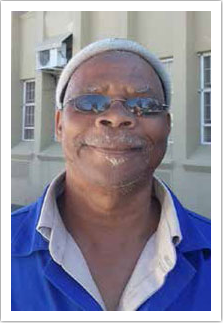 Rolled out in 1994 through the Department of Social Development, the programme was established to help tackle poverty.
Rolled out in 1994 through the Department of Social Development, the programme was established to help tackle poverty.
Today more than 20 million South Africans receive assistance in the form of social grants, which range from old age grants, disability grants and child support grants.
Vuk’uzenzele spoke to families whose lives have been changed by the social assistance programme.
Conquering my disability
For Vinesh Sewpersad who lives in Cornubia in KwaZulu-Natal the disability grant he receives has not only enabled him to put food on the table but also helped restore his dignity.
Born with dwarfism, a genetic or medical condition that results in short stature, Sewpersad struggled for many years to find employment.
He now lives with his wife Lagni in government’s new integrated Cornubia Housing Development launched by President Jacob Zuma recently and is not only a social grant recipient, but a proud first-time homeowner.
“Government has really helped change my life; first through my disability grant and now by giving my family a home. I feel very lucky and very proud,” he said.
Sewpersad first received assistance from government 20 years ago, when he applied for a disability grant. Today he receives a monthly grant of R1 350, which he uses to pay for electricity, buy groceries, pay for transport and medication.
“I cannot even think about how life would be for my wife and I without this steady income,” he said.
Even though he receives a grant, it is sometimes not enough to cover monthly expenses.
“To make ends meet Lagni does her best to find jobs here and there but it is tough to find a permanent job.”
Sewpersad said he is thankful to government for giving him and fellow South Africans the chance to lead better lives, adding that every bit of help made a difference.
Fostering a future for her family
Tshidi Ndula is unlike any 28-year-old you would meet. She is a strong, loving woman who has dedicated her life to taking care of her four younger siblings after the loss of her parents.
She became the head of her household many years. and Ndula, who lives in the Mavhina village in Vhembe, Limpopo, put her dreams on hold to take care of her younger siblings Embrose, 21, Belen 17, Winterose, 14 and Rikhotso, 10.
With no income and unable to work as well as take care of her siblings, Ndula applied for a foster care grant at the Department of Social Development.
Today she is the foster care parent to her family, receiving R830 each for Embrose, Belen and a child support grant of R310 for Rikhotso.
“The grants have allowed us to stay together as a family and we are able to buy food, clothes and live a comfortable life.”
Ndula said she is also able to save a portion of the grants to make sure that she can send her brothers and sisters to university.
“For now our focus is on getting Embrose through university. He is a first-year student at the Tshwane University of Technology,” she added.
“Government has really helped me take care of my family and for that I am so grateful,” said Ndula.
Investing in a better tomorrow
Government assistance is helping Charles Lewis from Colville in Kimberley save and invest in a better future for his family.
The 60-year-old, who receives an old age grant of R1 350 a month, said he was trying to use the money wisely.
The grant helps pay for his family’s necessities, like medical care and his car insurance but Lewis has gone a step further by also investing in a funeral policy that would benefit his wife and children in the future.
Lewis has four children, two are over the age of 21 and are able to take care of themselves and the younger children are aged 18 and 7.
“I try to use the money very wisely, and even sometimes have a little left over that I use to buy the kids whatever they need.” Despite the grant application process being quite rigorous, Lewis says he is grateful for the help he receives.
For more information on social grants contact the South African Social Security Agency (SASSA) on 086 60 10 11 or 012 400 2322.
SA, China sign labour pact
SA, China sign labour pact sadminInternational relations
South Africa and China will strengthen cooperation in the areas of human resources and employment services.
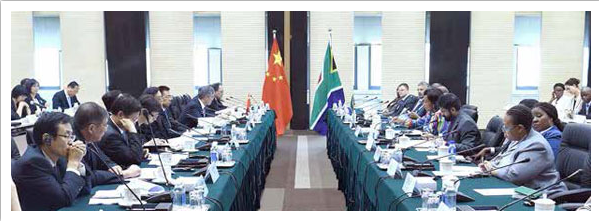 Labour Minister Mildred Oliphant and her Chinese counterpart, Yin Weimin, met recently to share ideas on improving human resource development in both countries.
Labour Minister Mildred Oliphant and her Chinese counterpart, Yin Weimin, met recently to share ideas on improving human resource development in both countries.
The two Ministers also signed a memorandum of understanding, which will see parties working together to strengthen employment services, labour inspection services, social security and employment programmes to meet the challenges of the labour market and globalisation.
“During my visit to China in August 2013, we learnt a lot about your labour market and visited institutions of interest to us.
“Key amongst them was the Public Employment Centre in Haidian District, where I was quite impressed with the advanced digital display-wall reflecting by-the-second updates on vacancies,” Minister Oliphant told Yin.
Yin said China was looking forward to deeper cooperation with South Africa.
“The purpose of our visit is to promote our exchanges in the fields of human resources and employment services between South Africa and China,” he added.
Youth unemployment remains a huge challenge globally and domestically.
Minister Oliphant said government, however, was addressing these issues through active labour market programmes such as learnerships, the Expanded Public Works Programme and other targeted initiatives like the Youth Accord and Youth Incentive.
Minister Oliphant said during the sixth BRICS (Brazil, Russia, India, China and South Africa) Summit held in Fortaleza, Brazil, the leaders agreed that a Labour and Employment, Social Security and Social Inclusion Public Policies Forum be explored as a new area of focus.
She said she was aware of informal discussions of officials in Geneva with a view to formalise agreements in this forum.
The Minister said she was keen that this initiative be supported to ensure that labour and employment issues also get the proper recognition within BRICS’ processes.
SADC leaders to push for industrialisation
SADC leaders to push for industrialisation sadminInternational relations
Southern African leaders have committed to put industrialisation at the top of Southern African Development Community’s (SADC) regional integration agenda.
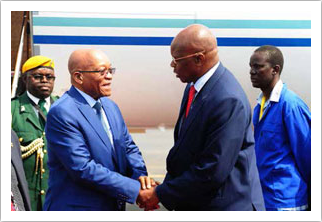 Regional leaders from SADC member states met in Zimbabwe recently, where they discussed the latest developments and challenges facing the region.
Regional leaders from SADC member states met in Zimbabwe recently, where they discussed the latest developments and challenges facing the region.
A Ministerial Task Force on Regional Economic Integration was ordered to develop a strategy and roadmap for industrialisation in the region.
The theme for the summit, ‘SADC Strategy for Economic Transformation: Leveraging the Region’s Diverse Resources for Sustainable Economic and Social Development through Beneficiation and Value Addition’, was inspired by the need for the region to beneficiate more of its mineral resources, instead of exporting raw materials.
Ebola virus
The summit also discussed the threat posed by the Ebola virus.
Member states were urged to continue putting in place measures to prevent its spread and to effectively contain it, in case of an outbreak in the SADC region.
The deadly disease has claimed more than 1 000 lives in West Africa since its outbreak, but there have been no confirmed cases in the southern Africa region.
SADC to support Lesotho
Regional leaders also pledged to continue supporting South Africa’s neighbouring country Lesotho, where there has been by political strife recently.
The summit encouraged the coalition government leaders to continue to provide leadership in its effort to find a lasting political solution to the current impasse.
President Jacob Zuma, who was elected to chair the SADC Organ on Politics, Defence and Security, will monitor the situation in his neighbouring country.
He is expected to carry through SADC’s appeal to all political leaders and the people in general to refrain from any action that may undermine peace and stability in the country.
Food security
On agriculture and food security, SADC leaders said they had noted increases in food production in the region during the 2013 - 2014 growing season.
“However, humanitarian assistance and malnutrition still remained a challenge. To this end, the summit endorsed a Regional Food and Nutrition Security Strategy for 2015 to 2025 to ensure improved food availability, accessibility and utilisation in a more sustainable manner,” read a summit declaration.
Other issues
The summit also noted progress on the status of women’s representation in politics and decision-making, and urged member states to put in place effective legislation, policies and strategies to sustain the achievements recorded so far.
The summit also noted progress in the prevention and control of HIV and Aids, TB and malaria, all of which have shown a declining trend.
In his closing speech, Zimbabwean President Robert Mugabe, who will be chairperson of the regional body for the next year, said the decisions of the summit could only be meaningful to the region if they are implemented.
“We therefore need to improve our scorecard on that front. I have no doubt that together we will achieve.”
President Mugabe pledged to work to ensuring that beneficiation and value addition is enhanced in the region during his tenure as SADC chairperson.
Sport federations to sign transformation agreement
Sport federations to sign transformation agreement sadminSport, arts and culture
South African sports federations will soon sign a national agreement on transformation.
 The Minister of Sport and Recreation- Minister Fikile Mbalula, who made the announcement, said he had already received transformation plans from the South African Rugby Union, South African Football Association and Cricket SA, and would soon receive the transformation plan from Athletics South Africa.
The Minister of Sport and Recreation- Minister Fikile Mbalula, who made the announcement, said he had already received transformation plans from the South African Rugby Union, South African Football Association and Cricket SA, and would soon receive the transformation plan from Athletics South Africa.
He was speaking at the announcement of a partnership with Nestlé South Africa, through its Milo brand, as the official sponsor of the School Sport Programme.
“We are a few months away from signing the national agreement on transformation, so I’m not only optimistic, I’m over the moon about the progress we are making when it comes to the transformation agenda in South Africa,” said the Minister.
Federations are expected to reintroduce racial quotas, requiring that a certain number of ‘players of colour’ are included in the national teams. “We are on track and within the trajectory of a developmental state and transforming society,” Minister Mbalula added.
He said there would be consequences should sporting federations not implement the transformation agreement.
School Sport Programme
The School Sport Programme aims to develop football and netball skills among school-going children under the age of 13. The programme, which started in January, aims to reach 15 000 learners across the country by December this year.
Basic Education Director for Sport, Arts and Culture Nozimpho Xulu said the department was committed to getting children to participate in sports.
“We are really committed to getting the number of schools that are in the rural areas and townships to make an impact under this programme. Those are the main beneficiaries of the school sport programme.”
Nestlé South Africa’s Business Manager for Dairy Mpho Toolo said: “This partnership further strengthens our commitment to promoting active and balanced lifestyles among children and will enable us to create an awareness about the importance of physical activity and good nutrition at an early age.”
Holiday programme gives children hope
Holiday programme gives children hope sadminSport, arts and culture
The Gauteng Department of Social Development, together with the Jonathan Butler Foundation (JBF), have found a way to keep children busy and off the streets during the school holidays.
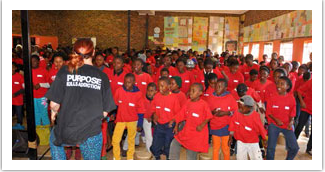 Following the visit by President Jacob Zuma to Eldorado Park in May 2013, the JBF launched the Jonathan Butler Holiday Programme under the slogan: “Purpose Kills Addiction”.
Following the visit by President Jacob Zuma to Eldorado Park in May 2013, the JBF launched the Jonathan Butler Holiday Programme under the slogan: “Purpose Kills Addiction”.
“The Gauteng Department of Social Development approached the JBF to provide a solution through the arts after our successful launch of the JBF in partnership with the premier’s office in September 2013,” said Freddy Arendse, the CEO of the JBF.
The main purpose of this programme, which runs for four days, alternating between four different communities that are affected by substance abuse, is to keep children off the street and drug-associated crimes and help them focus on a healthy and positive future.
“Over these four days the facilitators present four modules in music, drama, visual arts and dance,” said Arendse.
On the last day of the programme the children showcase what they have learnt in the community hall.
The programme takes in 500 children between the ages of 10 to 16 from local primary schools. The programme also benefits the community by creating work opportunities for local people who get paid a stipend for their contribution to the programme.
“The bulk of the initial funding for the launch of the JBF was provided by the National Lotteries Distribution Trust Fund and partly by the Gauteng Premier’s office. The Lotto also contributed to our other arts development programmes. The duplication of the holiday programme was specifically funded by the Gauteng Department Social Development for 2014.”
The next holiday programme will take place in Eersterust, Pretoria, during the December school holidays and then during the next year’s March/April school holidays at Westbury, Johannesburg.
The department’s Director of Substance Abuse Prevention, Tebello Mkhonto, said the department decided to sponsor the programme with the aim of preventing substance abuse in communities.
“The Gauteng Provincial Government decided to sponsor the programme because of its strong focus on substance abuse and giving children hope for the future. It also equips the kids with different skills,” she said.
Youth urged to discover SA’s struggle history
Youth urged to discover SA’s struggle history sadminSport, arts and culture
The youth of South Africa have been encouraged to take an interest in learning more about the country’s struggle history.
Freedom Park, in collaboration with the KwaZulu-Natal Department of Arts, Culture, Sports and Recreation, launched the Struggle T-shirt exhibition at Freedom Park in Pretoria recently.
Freedom Park Acting CEO Jane Mufamadi said South Africa’s triumphant struggle for freedom is regarded as one of the most notable human achievements of the 20th century for equality and humanity on the continent and internationally.
“The liberation of South Africa was waged on all fronts…South Africans had to resort to all forms of struggle to liberate themselves from one of the most brutal systems declared by the United Nations as a crime against humanity,” Mufamadi said.
The exhibition showcases T-shirts showing several messages from the struggle era. The aim is to educate South Africans about the struggle for liberation and how it resulted in an inclusive democracy and nationalism in 1994.
Mufamadi said they want to remind the youth that the liberation came about as a result of the hard-won struggle by all South Africans, both from within and outside South Africa.
She said one of the greatest weapons used to carry the message was by converting every worker, student, clergyman and citizen to become mobile billboards in every part of South Africa.
She also called on schools to encourage learners to visit Freedom Park so they could learn more about the country’s history.
“We urge all South Africans, young and old, to visit Freedom Park and see for themselves, especially school learners and students.”
There are about 80 000 names of late struggle heroes and heroines engraved at Freedom Park.
Freedom Park is a cultural institution housing a museum and memorial dedicated to recording and honouring the many people who contributed to South Africa's liberation.
The museum celebrates South Africa's heritage and strives to accommodate all of the country’s experiences and symbols to tell one coherent story.
